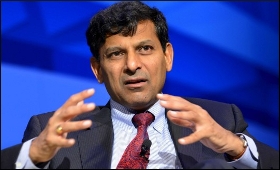|

|
RBI wants to liberalise while strengthening bond markets: Rajan
|
|

|
|
| Top Stories |
 |
|
|
|
SME Times News Bureau | 27 Aug, 2016
Reserve Bank of India (RBI) Governor Raghuram Rajan on Friday said that the central bank aims to go for liberalisation while strengthening the bond market.
"Our aim is to liberalise steadily, but in a thoughtful way, continuously asking how further liberalisation will strengthen our domestic markets," he said while delivering the Annual Day lecture at the Foreign Exchange Dealer's Association of India (FEDAI).
Explaining the rationale behind the measures announced by RBI on Thursday for fixed income and currency markets, Rajan said the aim is at allowing greater participation to add liquidity while balancing it with caution in opening up.
"Greater access was allowed to retail investors, including to FPIs (foreign portfolio investors), to institution-dominated screen-based NDS-OM (Negotiated Dealing System-Order Matching System) market so that they could trade in G-Secs using their demat accounts," he said.
However, the central bank would continue to be careful about broadening retail access in markets that require sophisticated understanding, such as complex derivatives, he added.
The permission given for a moderate open position to all market participants, he said, would ensure that "we do not get excessive speculation or attempts at manipulation by single traders".
He added that it could also rectify market imbalances, improve exchange market liquidity and depth, without imposing large demands on banks or on the RBI.
Dwelling on the role of the regulator, Rajan said that financial innovation was sometimes seen in a bleak light as a way to evade or avoid taxes and regulations, but properly done, it could, however, slice and dice risks so that they were placed on the right shoulders.
"The key to the success of this market has been to allow the design of the relevant instrument to be governed by market participants, while ensuring regulatory concerns are satisfied," he pointed out.
Rajan said that all innovative instruments were not successful and suggested that "going forward, a level playing field on taxes is warranted for all instruments, so that instruments do not gain favor simply because they get better tax treatment".
He also said that an important function for the regulator in encouraging financial innovation was also to create the necessary infrastructure.
Noting that as a current account deficit country, India needed financing from abroad, ideally risk capital, which was in short supply in this country, he said encouraging Foreign Direct Investment, as well as equity investment was necessary for this.
As corporations moved to money and bond markets, the RBI would also nudge them further by imposing higher provisioning and capital requirements for banks on corporate lending when exposures become large, he said.
Further, the RBI has allowed banks to offer credit enhancement to bonds issued by infrastructure projects that need substantial amounts of financing but may not start out highly rated.
In this context, the Governor also clarified that in order for state government obligations to have zero risk weight, and have the highest rating, it was important that there be no explicit or implicit default or restructuring of such obligations.
Pointing out that the regulator has to be careful not to relax prudential regulations simply because an entity or activity was deemed of national importance, Rajan stated that it was far better for the government to directly subsidise activities that were of national importance like infrastructure if it deemed them important than for the RBI to sacrifice systemic stability.
|
|
|
| |
|
|
|
|
|
|
|
|
|
|
|
|
|
|
| |
| Customs Exchange Rates |
| Currency |
Import |
Export |
US Dollar
|
66.20
|
64.50 |
UK Pound
|
87.50
|
84.65 |
Euro
|
78.25
|
75.65 |
| Japanese
Yen |
58.85 |
56.85 |
| As on 13 Aug, 2022 |
|
|
| Daily Poll |
 |
 |
| PM Modi's recent US visit to redefine India-US bilateral relations |
|
|
|
|
|
| Commented Stories |
 |
|
|
|
|
|
| |
|